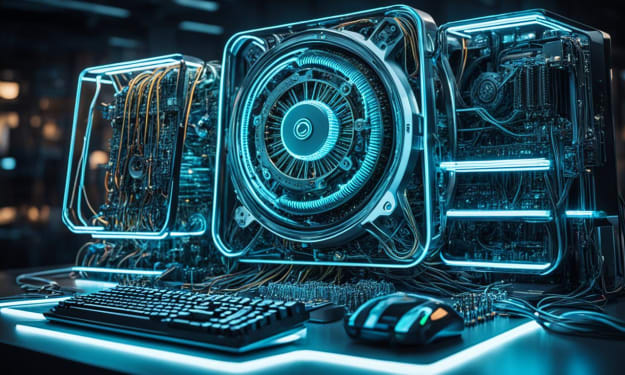The Impact of Artificial Intelligence on the Job Market and the Future of Work
AI and Job Displacement: A Double-Edged Sword

In recent years, artificial intelligence (AI) has rapidly evolved from a futuristic concept to an integral part of our daily lives. From virtual assistants like Siri and Alexa to advanced machine learning algorithms used in industries such as healthcare, finance, and manufacturing, AI's influence is undeniable. As this technology continues to advance, it brings both opportunities and challenges to the job market and the future of work. This article explores these dynamics and their potential implications.
The Rise of AI: A Technological Revolution
AI refers to the simulation of human intelligence processes by machines, particularly computer systems. These processes include learning (acquiring information and rules for using the information), reasoning (using the rules to reach approximate or definite conclusions), and self-correction. Over the past decade, AI has made significant strides, thanks in large part to advances in machine learning, deep learning, and neural networks.
One of the most significant developments in AI is its ability to analyze vast amounts of data quickly and accurately. This capability has transformed various sectors. In healthcare, AI algorithms can diagnose diseases such as cancer from medical images with a level of accuracy that rivals or surpasses human experts. In finance, AI-driven trading systems can analyze market trends and execute trades at lightning speed. In manufacturing, AI-powered robots perform tasks with precision and efficiency, reducing errors and improving productivity.
AI and Job Displacement: A Double-Edged Sword
While AI presents numerous benefits, it also poses a considerable threat to the traditional job market. Automation and AI technologies can perform tasks previously done by humans, leading to job displacement in certain sectors. For example, automated customer service bots are increasingly replacing call center employees, and self-checkout systems are reducing the need for cashiers in retail stores.
A report by McKinsey Global Institute estimated that by 2030, up to 800 million jobs could be lost worldwide due to automation. Jobs that involve routine, repetitive tasks are particularly vulnerable. This includes roles in manufacturing, data entry, and even some aspects of administrative support.
However, it is essential to recognize that while AI may displace certain jobs, it also creates new opportunities. History has shown that technological advancements often lead to the creation of new industries and job categories. For instance, the rise of the internet gave birth to the digital marketing industry, web development, and countless other professions that did not exist before.
The Creation of New Opportunities
AI is not just about replacing human labor; it is also about augmenting it. AI technologies can enhance human capabilities and productivity. In many cases, AI acts as a tool that allows workers to perform their jobs more effectively. For example, AI can assist doctors in diagnosing diseases, but it cannot replace the nuanced decision-making and empathy that human physicians provide. Similarly, AI can analyze vast datasets, but it still requires human expertise to interpret the results and make strategic decisions.
Moreover, the development and maintenance of AI systems require skilled professionals. This includes roles such as AI researchers, data scientists, machine learning engineers, and AI ethicists. As AI technology continues to evolve, the demand for these professionals is expected to grow.
The Future of Work: Adapting to Change
The integration of AI into the workforce necessitates a shift in how we approach education and skill development. As certain jobs become automated, there is a growing need for workers to acquire new skills that are relevant in an AI-driven economy. This includes not only technical skills, such as programming and data analysis but also soft skills, such as critical thinking, creativity, and emotional intelligence.
Governments, educational institutions, and businesses must collaborate to create programs and policies that facilitate lifelong learning and reskilling. This could involve initiatives such as coding boot camps, online courses, and apprenticeship programs. Additionally, policies that support workers during transitions, such as unemployment benefits and job placement services, will be crucial in mitigating the impact of job displacement.
Ethical Considerations and AI Governance
As AI becomes more prevalent in the workplace, it is essential to address ethical considerations and establish robust governance frameworks. Issues such as data privacy, algorithmic bias, and transparency must be carefully managed to ensure that AI is used responsibly and equitably.
Algorithmic bias, in particular, is a significant concern. AI systems are trained on data, and if the data reflects existing societal biases, the AI can perpetuate and even amplify these biases. For example, an AI hiring system trained on historical hiring data might favor certain demographics over others, leading to discriminatory practices. To combat this, it is crucial to implement rigorous testing and auditing of AI systems and to develop guidelines that promote fairness and accountability.
Conclusion
Artificial intelligence is undoubtedly transforming the job market and the future of work. While it presents challenges, such as job displacement, it also offers opportunities for innovation and growth. By embracing AI and adapting to its changes, we can create a future where humans and machines work together harmoniously, enhancing productivity and driving progress. However, this requires a concerted effort to invest in education, promote ethical AI practices, and support workers through transitions. As we navigate this technological revolution, the goal should be to harness the potential of AI to improve our lives and create a more equitable and prosperous society.
About the Creator
Beauty Lovery
https://premium.chat/beauty258
Enjoyed the story? Support the Creator.
Subscribe for free to receive all their stories in your feed. You could also pledge your support or give them a one-off tip, letting them know you appreciate their work.
Reader insights
Outstanding
Excellent work. Looking forward to reading more!
Top insight
Eye opening
Niche topic & fresh perspectives






Comments (1)
Thank you for the interesting and delicious content. Follow my stories now.